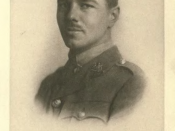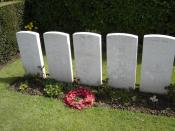'The Soldier' is a sonnet written by Rupert Brooke during the Great War. It was published in 1915. In his war poem Rupert Brooke talks about his feelings toward his home country. He is very concerned with informing the reader about the riches of England and what 'she' [England] can give to others. He is very patriotic telling the reader that it is honourable and heroic to die for one's country. 'Dulce Et Decorum Est' is written by Wilfred Owen. This war poem is written in iambic pentameter. In Owen's war poem he communicates shock of the reality of war. Though later the reader discovers the irony of the poem. There are many contrasting factors between the two poems; one talks about the positive things about war while the other draws attention to the awful reality of war.
Firstly, imagery is used in both poems allowing the reader to create a more detailed picture of the theme.
Rupert Brooke uses personification to describe his loving and patriotic feelings about England. This is evident in the line, "A dust whom England bore, shaped, made aware, gave once her flowers to love, her ways to roam..." This supports the ways in which he feels England has helped the people. Throughout the poem he compares England to a woman, so every time he speaks of England he refers to it as 'she.' He makes it sounds like England has done everything for the people. More specifically I am convinced that he is talking about a motherly role. 'She' is nurturing and all loving which gives her this role. Rupert Brooke uses similes to compare England to the brightness and optimistic things about daytime. This is apparent as it is said, "Her sights and sounds; dreams happy as her day..." This quotation...


